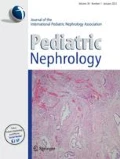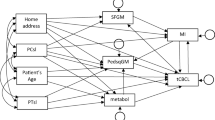Abstract
Recent years has seen an increasing interest in the quality of life (QOL) of children with chronic kidney disease (CKD). The objective of this cross-sectional study was to investigate the prevalence of behavioral disorders and to assess the health-related QOL (HRQOL) in 136 patients with CKD. To estimate the prevalence of behavior disorders and analyze HRQOL, we used the Strengths and Difficulties Questionnaire (SDQ) and Pediatric Inventory of Quality of Life (PedsQL) Core Scales as assessment tools for both the patients and caregivers. When compared to healthy controls, the CKD group had significantly lower scores in almost all PedsQL domains. After adjustment, only absence of religion/other religions remained significantly associated with a lower global HRQOL score [odds ratio (OR) 6.2, P = 0.009]. Among the parents, two factors remained significantly associated with a lower global HRQOL score: patients’ age >10 years (OR 5.4, P = 0.033) and absence of religion/other religions (OR 3.2, P = 0.038). The CKD group demonstrated a higher proportion of behavioral and emotional disorders in all SDQ domains. There was a negative correlation between the presence of behavior and emotional disorders and HRQOL score (r = −0.552, P < 0.001). Our findings suggest the importance of evaluating behavioral and social repercussions of CKD in order to improve the life quality of this pediatric population.


Similar content being viewed by others
References
Newacheck PW, Taylor WR (1992) Childhood chronic illness: prevalence, severity, and impact. Am J Public Health 82:364–371
Varni JW, Limbers CA, Burwinkle TM (2007) Impaired health-related quality of life in children and adolescents with chronic conditions: a comparative analysis of 10 disease clusters and 33 disease categories/severities utilizing the PedsQL 4.0 Generic Core Scales. Health Qual Life Outcomes 5:43
Baum M (2010) Overview of chronic kidney disease in children. Curr Opin Pediatr 22:158–160
Ferris ME, Gipson DS, Kimmel PL, Eggers PW (2006) Trends in treatment and outcomes of survival of adolescents initiating end-stage renal disease care in the United States of America. Pediatr Nephrol 21:1020–1026
McDonald SP, Craig JC (2004) Long-term survival of children with end-stage renal disease. N Engl J Med 350:2654–2662
Goldstein SL, Gerson AC, Furth S (2007) Health-related quality of life for children with chronic kidney disease. Adv Chronic Kidney Dis 14:364–369
Varni JW, Burwinkle TM, Lane MM (2005) Health-related quality of life measurement in pediatric clinical practice: an appraisal and precept for future research and application. Health Qual Life Outcomes 3:34
Matza LS, Swensen AR, Flood EM, Secnik K, Leidy NK (2004) Assessment of health-related quality of life in children: a review of conceptual, methodological, and regulatory issues. Value Health 7:79–92
Gerson A, Hwang W, Fiorenza J, Barth K, Kaskel F, Weiss L, Zelikovsky N, Fivush B, Furth S (2004) Anemia and health-related quality of life in adolescents with chronic kidney disease. Am J Kidney Dis 44:1017–1023
Fadrowski J, Cole SR, Hwang W, Fiorenza J, Weiss RA, Gerson A, Furth SL (2006) Changes in physical and psychosocial functioning among adolescents with chronic kidney disease. Pediatr Nephrol 21:394–399
Goldstein SL, Graham N, Burwinkle T, Warady B, Farrah R, Varni JW (2006) Health-related quality of life in pediatric patients with ESRD. Pediatr Nephrol 21:846–850
Grootenhuis MA, Stam H, Last BF, Groothoff JW (2006) The impact of delayed development on the quality of life of adults with end-stage renal disease since childhood. Pediatr Nephrol 21:538–544
McKenna AM, Keating LE, Vigneux A, Stevens S, Williams A, Geary DF (2006) Quality of life in children with chronic kidney disease-patient and caregiver assessments. Nephrol Dial Transplant 21:1899–1905
Falger J, Landolt MA, Latal B, Ruth EM, Neuhaus TJ, Laube GF (2008) Outcome after renal transplantation. Part II quality life psychosocial adjustment. Pediatr Nephrol 23:1347–1354
Goldstein SL, Graham N, Warady BA, Seikaly M, McDonald R, Burwinkle TM, Limbers CA, Varni JW (2008) Measuring health-related quality of life in children with ESRD: performance of the generic and ESRD-specific instrument of the Pediatric Quality of Life Inventory (PedsQL). Am J Kidney Dis 51:285–297
Goldstein SL, Rosburg NM, Warady BA, Seikaly M, McDonald R, Limbers C, Varni JW (2009) Pediatric end stage renal disease health-related quality of life differs by modality: a PedsQL ESRD analysis. Pediatr Nephrol 24:1553–1560
Buyan N, Turkmen MA, Bilge I, Baskin E, Haberal M, Bilginer Y, Mir S, Emre S, Akman S, Ozkaya O, Fidan K, Alpay H, Kavukcu S, Sever L, Ozcakar ZB, Dogrucan N (2010) Quality of life in children with chronic kidney disease (with child and parent assessments). Pediatr Nephrol 25:1487–1496
Wiedebusch S, Konrad M, Foppe H, Reichwald-Klugger E, Schaefer F, Schreiber V, Muthny FA (2010) Health-related quality of life, psychosocial strains, and coping in parents of children with chronic renal failure. Pediatr Nephrol 25:1477–1485
Soares CM, Diniz JS, Lima EM, Oliveira GR, Canhestro MR, Colosimo EA, Silva AC Simoes e, Oliveira EA (2009) Predictive factors of progression to chronic kidney disease stage 5 in a predialysis interdisciplinary programme. Nephrol Dial Transplant 24:848–855
Soares CM, Diniz JS, Lima EM, Silva JM, Oliveira GR, Canhestro MR, Colosimo EA, Silva AC Simoes e, Oliveira EA (2008) Clinical outcome of children with chronic kidney disease in a pre-dialysis interdisciplinary program. Pediatr Nephrol 23:2039–2046
Soares CM, Oliveira EA, Diniz JS, Lima EM, Vasconcelos MM, Oliveira GR (2003) Predictive factors of progression of chronic renal insufficiency: a multivariate analysis. Pediatr Nephrol 18:371–377
Goodman R (1997) The Strengths and Difficulties Questionnaire: a research note. J Child Psychol Psychiatry 38:581–586
Madden SJ, Hastings RP, V'Ant Hoff W (2002) Psychological adjustment in children with end stage renal disease: the impact of maternal stress and coping. Child Care Health Dev 28:323–330
Goodman R, Scott S (1999) Comparing the Strengths and Difficulties Questionnaire and the Child Behavior Checklist: is small beautiful? J Abnorm Child Psychol 27:17–24
Goodman R (1999) The extended version of the Strengths and Difficulties Questionnaire as a guide to child psychiatric caseness and consequent burden. J Child Psychol Psychiatry 40:791–799
Varni JW, Seid M, Rode CA (1999) The PedsQL: measurement model for the pediatric quality of life inventory. Med Care 37:126–139
Cury CR, Golfeto JH (2003) Strengths and difficulties questionnaire (SDQ): a study of school children in Ribeirao Preto. Rev Bras Psiquiatr 25:139–145
Klatchoian DA, Len CA, Terreri MT, Silva M, Itamoto C, Ciconelli RM, Varni JW, Hilario MO (2008) Quality of life of children and adolescents from Sao Paulo: reliability and validity of the Brazilian version of the Pediatric Quality of Life Inventory version 4.0 Generic Core Scales. J Pediatr (Rio J) 84:308–315
Anthony SJ, Hebert D, Todd L, Korus M, Langlois V, Pool R, Robinson LA, Williams A, Pollock-BarZiv SM (2010) Child and parental perspectives of multidimensional quality of life outcomes after kidney transplantation. Pediatr Transplant 14:249–256
Gerson AC, Wentz A, Abraham AG, Mendley SR, Hooper SR, Butler RW, Gipson DS, Lande MB, Shinnar S, Moxey-Mims MM, Warady BA, Furth SL (2010) Health-related quality of life of children with mild to moderate chronic kidney disease. Pediatrics 125:e349–e357
Fielding D, Brownbridge G (1999) Factors related to psychosocial adjustment in children with end-stage renal failure. Pediatr Nephrol 13:766–770
Curlin FA, Sellergren SA, Lantos JD, Chin MH (2007) Physicians' observations and interpretations of the influence of religion and spirituality on health. Arch Intern Med 167:649–654
Sloan RP, Bagiella E, Powell T (1999) Religion, spirituality, and medicine. Lancet 353:664–667
Levin J, Chatters LM, Taylor RJ (2005) Religion, health and medicine in African Americans: implications for physicians. J Natl Med Assoc 97:237–249
Curlin FA, Hall DE (2005) Strangers or friends? A proposal for a new spirituality-in-medicine ethic. J Gen Intern Med 20:370–374
Post SG, Puchalski CM, Larson DB (2000) Physicians and patient spirituality: professional boundaries, competency, and ethics. Ann Intern Med 132:578–583
IBGE (2000) Censo 2000. Brazilian Institute of Geography and Statistics. Available at: http://www.ibge.gov.br/home/estatistica/populacao/censo2000/populacao/cor_raca_Censo2000.pdf. Accessed July 2010
McMillan DW (1996) Sense of community. J Community Psychol 24:315–325
Obst P, Tham N (2009) Helping the soul: the relationship between connectivity and well-being within a church community. J Community Psychol 37:342–361
Eiser C (1990) Psychological effects of chronic disease. J Child Psychol Psychiatry 31:85–98
Bakr A, Amr M, Sarhan A, Hammad A, Ragab M, El-Refaey A, El-Mougy A (2007) Psychiatric disorders in children with chronic renal failure. Pediatr Nephrol 22:128–131
Fukunishi I, Honda M (1995) School adjustment of children with end-stage renal disease. Pediatr Nephrol 9:553–557
Fukunishi I, Kudo H (1995) Psychiatric problems of pediatric end-stage renal failure. Gen Hosp Psychiatry 17:32–36
Garralda ME, Jameson RA, Reynolds JM, Postlethwaite RJ (1988) Psychiatric adjustment in children with chronic renal failure. J Child Psychol Psychiatry 29:79–90
Gerson AC, Riley A, Fivush BA, Pham N, Fiorenza J, Robertson J, Chandra M, Trachtman H, Weiss R, Furth SL (2005) Assessing health status and health care utilization in adolescents with chronic kidney disease. J Am Soc Nephrol 16:1427–1432
Hooper SR, Duquette PJ, Icard P, Wetherington CE, Harrell W, Gipson DS (2009) Social-behavioural functioning in paediatric chronic kidney disease. Child Care Health Dev 35:832–840
Soliday E, Kool E, Lande MB (2000) Psychosocial adjustment in children with kidney disease. J Pediatr Psychol 25:93–103
Brownbridge G, Fielding DM (1991) Psychosocial adjustment to end-stage renal failure: comparing haemodialysis, continuous ambulatory peritoneal dialysis and transplantation. Pediatr Nephrol 5:612–616
Henning P, Tomlinson L, Rigden SP, Haycock GB, Chantler C (1988) Long term outcome of treatment of end stage renal failure. Arch Dis Child 63:35–40
Lane PH (2005) Puberty and chronic kidney disease. Adv Chronic Kidney Dis 12:372–377
Slickers J, Duquette P, Hooper S, Gipson D (2007) Clinical predictors of neurocognitive deficits in children with chronic kidney disease. Pediatr Nephrol 22:565–572
Falger J, Latal B, Landolt MA, Lehmann P, Neuhaus TJ, Laube GF (2008) Outcome after renal transplantation. Part I: intellectual and motor performance. Pediatr Nephrol 23:1339–1345
Bell L (2007) Adolescent dialysis patient transition to adult care: a cross-sectional survey. Pediatr Nephrol 22:720–726
Bell L (2007) Adolescents with renal disease in an adult world: meeting the challenge of transition of care. Nephrol Dial Transplant 22:988–991
Maxwell H, MacKinlay D, Watson AR (2010) Quality of life or health status in children with chronic kidney disease. Pediatr Nephrol 25:1191–1192
Menon S, Valentini RP, Kapur G, Layfield S, Mattoo TK (2009) Effectiveness of a multidisciplinary clinic in managing children with chronic kidney disease. Clin J Am Soc Nephrol 4:1170–1175
Watson AR (1995) Strategies to support families of children with end-stage renal failure. Pediatr Nephrol 9:628–631
Acknowledgments
This study was partially supported by CNPq (Brazilian National Research Council) and FAPEMIG. Dr. E.A. Oliveira, Dr. E.M. Lima, Dr. A.C. Simões e Silva, and Dr. H. Correa received a research grant from the Brazilian Research Council (CNPq).
Conflicts of interest
None.
Author information
Authors and Affiliations
Corresponding author
Rights and permissions
About this article
Cite this article
Marciano, R.C., Bouissou Soares, C.M., Diniz, J.S.S. et al. Behavioral disorders and low quality of life in children and adolescents with chronic kidney disease. Pediatr Nephrol 26, 281–290 (2011). https://doi.org/10.1007/s00467-010-1683-y
Received:
Revised:
Accepted:
Published:
Issue Date:
DOI: https://doi.org/10.1007/s00467-010-1683-y




